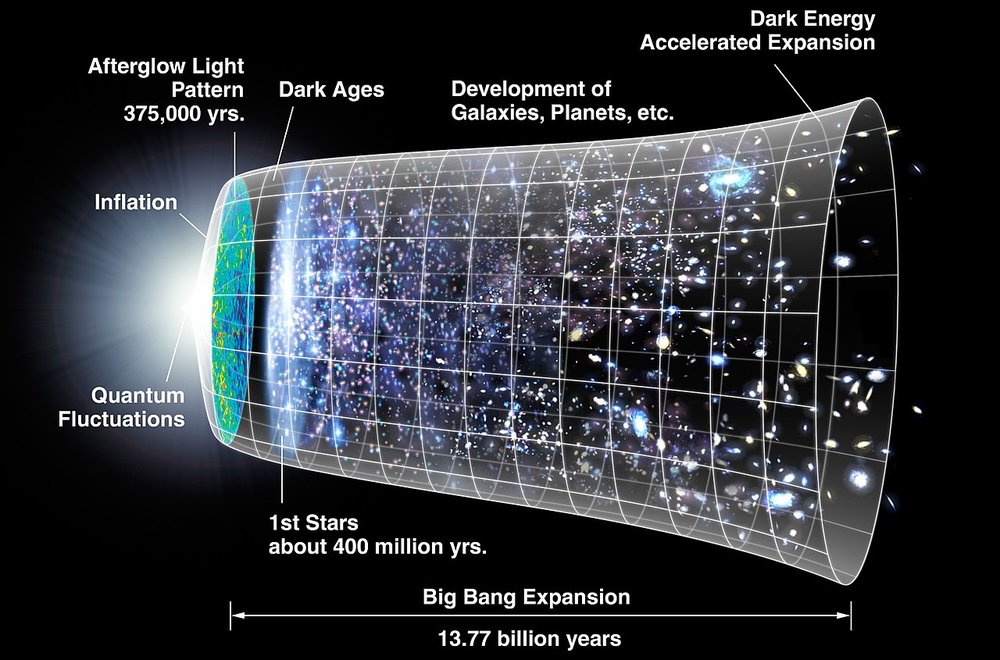[“What’s changed in the last 50 years” series]

As noted in my January 17, 2019, post “Cosmological fact and fiction,” the Big Bang theory poses questions on “whether terms like ‘origin’ or ‘creation’ even apply; and the limits of language to even discuss the topic.” [1]
So, perhaps a rethink was overdue on the topic, and “Starts with a bang” author Ethan Siegel delivers in this Big Think article. A historical recap. And contrasting the original notion of a singular “the Big Bang” (aka emergence of time-and-space) with the updated picture of a hot Big Bang (post inflation).
• Big Think > “The Big Bang no longer means what it used to” by Ethan Siegel” (August 24, 2022) – … the evolution of scientific terms must reflect our current understanding of reality. [2]
KEY TAKEAWAYS
• The idea that the Universe had a beginning, or a “day without a yesterday” as it was originally known, goes all the way back to Georges Lemaître in 1927.
• Although it’s still a defensible position to state that the Universe likely had a beginning, that stage of our cosmic history has very little to do with the “hot Big Bang” that describes our early Universe.
• Although many laypersons (and even a minority of professionals) still cling to the idea that the Big Bang means “the very beginning of it all,” that definition is decades out of date.
Here’s how to resolve the confusion and bring you up to speed on what the Big Bang originally meant versus what it means today.
Siegel notes that the historical cornerstones of the Big Bang theory do not entail an extrapolation to a zero point. Rather, “concrete predictions about the Universe” entail a chronology from a hot, dense state.
Although one was still free to extrapolate the Universe back to an arbitrarily small, dense state — even to a singularity, if you’re daring enough to do so — that was no longer the part of the Big Bang theory that had any predictive power to it.
So, “the original idea of a singularity” – that conversation – has faded. For example, with the idea of cosmological inflation.
… that inflationary expansion, unlike matter-and-radiation, didn’t follow a power law that leads back to a singularity but rather is exponential in character. … it never reaches a singular beginning.
He encourages getting beyond nostalgic bygone definitions.
Whether there was a singular, ultimate beginning [e.g., some type of pre-inflationary state] to all of existence or not, it no longer has anything to do with the hot Big Bang that describes our Universe from the moment that:
- inflation ended,
- the hot Big Bang occurred,
- the Universe became filled with matter and radiation and more,
- and it began expanding, cooling, and gravitating, eventually leading to the present day.
Cosmic simulations, in fact, use the updated model that Siegel discusses.
[Update 9-12-2022]
And Siegel’s point about the status of the “small, hot, dense” Big Bang is an important distinction. As explained in this StarTalk episode about recent clickbait headlines of Big Bang skepticism and the frontier of scientific research.
• YouTube > StarTalk > “Is the Big Bang Theory Wrong? Neil deGrasse Tyson Explains …” (Sep 6, 2022) – Are we rethinking the Big Bang? On this explainer, Neil deGrasse Tyson and comic co-host Chuck Nice break down Big Bang skepticism and what’s going on at the frontier of astrophysics.
0:00 – Introduction
1:19 – War of Ideas
3:55 – Search Results for “Big Bang Theory”
4:37 – Evidence for the Big Bang
5:23 – How the Big Bang Fits Into New Ideas
8:03 – Newtonian Conceptions of the Universe
8:57 – Theories of Relativity
10:20 – Closing Notes… but i have to address something that i think we’ve seen in the news. you know every six months goes by and then you see a headline, oh uh [like] “astrophysicists have to rethink the big bang” or “big bang debunked” … recently the james webb space telescope supposedly – the headline is um … “has the james webb telescope debunked the big bang.” yeah, it makes excellent clickbait … so, let me just explain a few things that’s going on here okay uh on the frontier of scientific research.
so, here’s the point. the tenets of the big bang that the universe started out small, hot, dense – uh where matter and energy were a primordial soup, where the forces of nature had merged – all of that is thoroughly supported by observations of this universe, thoroughly supported. okay. now there are some things that – well, did this really cause that, or might it be something that we don’t know about yet, and who ordered up the dark matter. we don’t know where that came from, and where’s this expansion – we don’t know where that came from. but we can describe it and we can measure it.
Notes
[1] Particularly in that post Sean Carroll’s list of misconceptions, as well as his Live Science article “What Happened Before the Big Bang?” (April 17, 2019 ), noted in a April 18, 2019, comment.
And Ethan Siegel’s own Medium article “Did Time Have A Beginning? (June 14, 2019), noted in a June 20, 2019, comment. And his Forbes article “Ask Ethan: How Did The Entire Universe Come From Nothing?” (Nov 27, 2020), noted in a November 30, 2020, comment.
[2] The caption for this article’s leading image is:
From a pre-existing state, inflation predicts that a series of universes will be spawned as inflation continues, with each one being completely disconnected from every other one, separated by more inflating space. One of these “bubbles,” where inflation ended, gave birth to our Universe some 13.8 billion years ago, where our entire visible Universe is just a tiny portion of that bubble’s volume. Each individual bubble is disconnected from all of the others, and each place where inflation ends gives rise to its own hot Big Bang.
